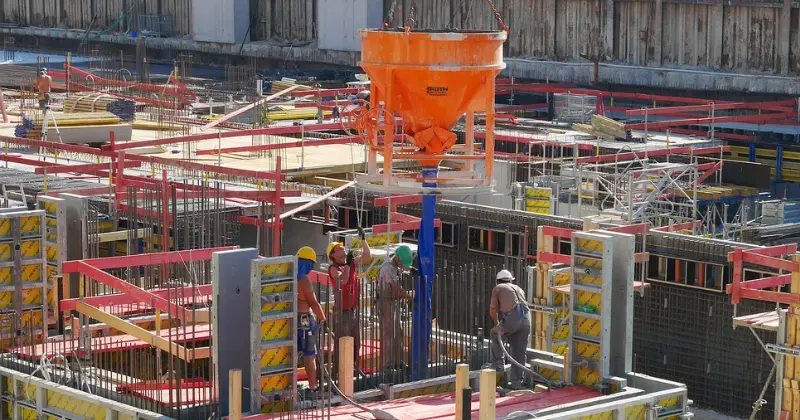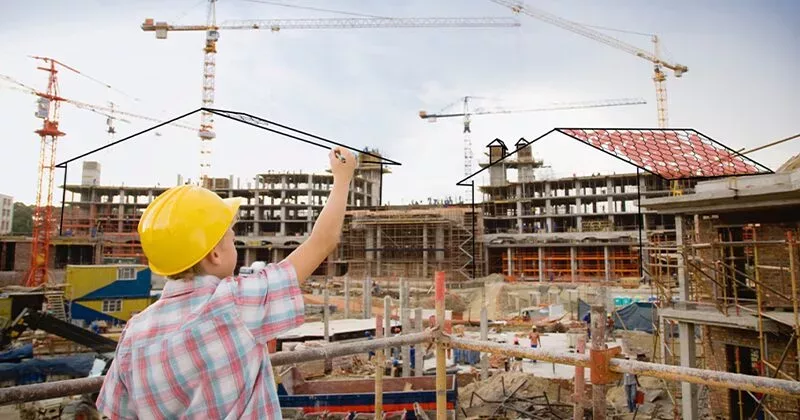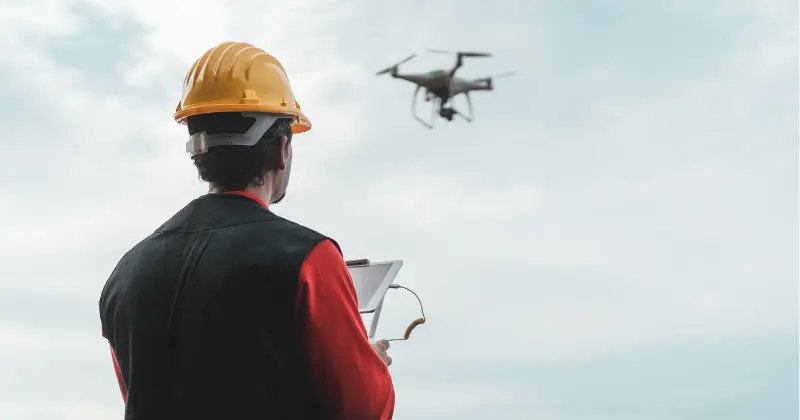11 mins read
What is a Construction Manager? Learn Key Responsibilities, Skills, and Challenges
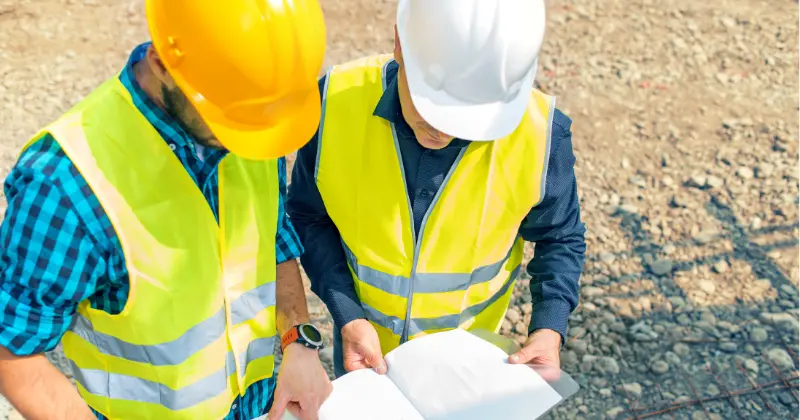
- What is a Construction Manager?
- What Does a Construction Manager Do?
- Key Construction Manager Skills
- How to Become a Construction Manager?
- How Much Can You Earn as a Construction Manager?
- What Challenges Do Construction Managers Face
- What Kind of Software Do Construction Managers Use for Their Work?
- Final Thoughts
The construction sector is becoming increasingly complex and competitive. At the same time, the industry is suffering from historical labor shortages, with 88% of construction companies saying they have trouble finding workers to hire. This presents an excellent opportunity for professionals looking to develop a career in construction. However, this process can be scary, considering how big and complex our industry is.
To understand the ins and outs of this massive sector, it is important to be aware of the people who comprise it, and the potential careers that can be followed. For that reason, we are putting together a series of blog posts that do a deep dive into various construction roles, describing their key responsibilities, skills, educational path, salary, and much more. We already discussed the role of a construction project manager in our previous blog. Today is the turn of the construction manager (CM).
Whether you are a young professional exploring a career in construction or just a curious reader looking to deepen your knowledge about the industry, this insightful guide will tell you everything you need to know about the role of a construction manager.
Let’s dive in!
What is a Construction Manager?
A construction manager (CM) is an experienced professional who oversees all aspects of a project’s construction phase. They have extensive knowledge and experience in construction trades, which helps them ensure the structure is completed on time and within budget.
In other words, a CM is like a project manager, except they focus specifically on the construction phase. They are often the most senior position you’ll find on a building site, which means they are qualified to make important decisions for success. CMs often work in an office near or on the building site to closely collaborate with engineers, architects, contractors, and other relevant stakeholders.
Can a Construction Manager be a Project Manager?
These two roles are often confused or used interchangeably. While they are similar in nature, they require different skills and oversee different things. On one side, the construction project manager (PM) oversees the entire project from start to finish and is the point of contact with the client. Conversely, the CM is focused on managing the construction phase and ensuring that day-to-day activities on-site go as expected. However, in small projects, a construction manager can take the PM role. At the end of the day, what is most important for this role is to have a lot of experience in the industry to make smart decisions that lead the project forward.
In general, there is a lot of discussion about how we define construction managers. That is because many companies and entities use their own definitions based on their needs and objectives. For instance, some define them as PMs, and others as site managers. For this blog, we will stick to the definition that CMs are the professionals who manage site operations, also known as site managers.
What Does a Construction Manager Do?
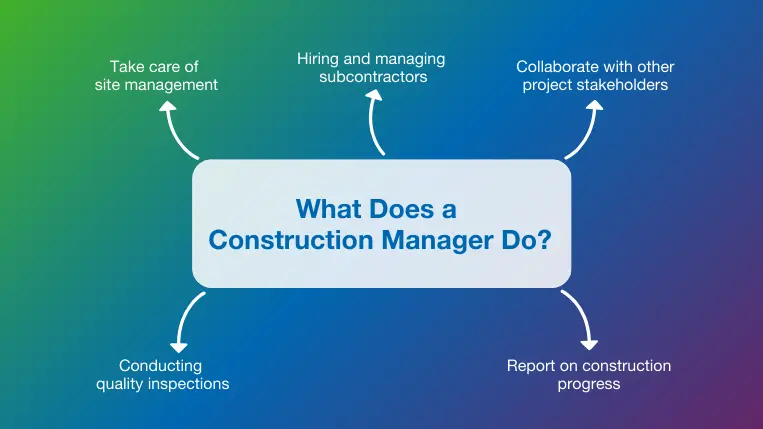
The main responsibility of a CM is to manage day-to-day activities on the construction site. This involves defining and overseeing schedules, implementing safety strategies, and managing personnel, among many other things. Below, we explore the key construction manager responsibilities.
Site management
As mentioned, the key responsibility of a CM is to ensure efficient and successful site management. This includes checking that all the materials, equipment, and personnel are on-site when they are needed, ensuring that all health and safety measures and protective equipment are available, dealing with any job site issues, emergencies, or delays, securing permits, and providing legal compliance, and just making sure that every detail is running smoothly.
Hiring and managing subcontractors
Another critical responsibility of this role is subcontractor management. This includes hiring them, negotiating the terms and conditions of their contracts, and defining work schedules so that the different trades can complete their work smoothly and without delays.
Collaborate with other project stakeholders
Collaborating with other stakeholders is something you’ll probably find in any job description in the construction industry. That is because collaboration in construction projects is critical to success. During its daily activities, the CM must collaborate with other stakeholders like architects, engineers, subcontractors, and more to ensure everyone is on the same page.
Report on construction progress
Being the main point of contact between the office and site staff, the CM is also responsible for developing construction reports to show progress to the project manager. These reports include data about the development of the different activities, potential risks, and improvement opportunities to keep all stakeholders informed. They also include recommendations or modifications that should be made to ensure maximum productivity and efficiency.
Conducting quality inspections
The level of experience and expertise of construction managers makes them qualified to carry out regular quality inspections to ensure the completed work meets the client’s and the law’s requirements. If any quality issues are found, they are also responsible for negotiating the changes with the contractor and mitigating the impact in terms of budget and schedule. Developing quality assurance strategies from early on is crucial to ensure any quality issues are spotted before changes can have a more significant impact.
Key Construction Manager Skills
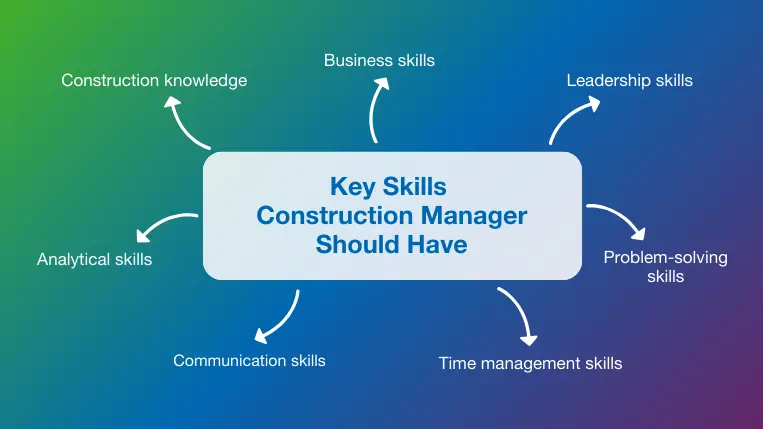
As you’ve learned, construction managers oversee many activities and people. That means they require some essential skills to ensure all aspects of their work can be completed as expected. Some of the key construction manager skills include:
- Construction knowledge: Arguably, the most critical skill a construction manager should have is industry knowledge. This includes understanding the processes and activities related to construction, regulatory compliance, safety and health standards, industry trends and technologies, and more.
- Business skills: Besides industry knowledge, construction managers must also have the business acumen to plan budgets and schedules, hire and manage staff, and coordinate with different teams.
- Leadership skills: As the most senior position on-site, the CM needs to have leadership skills to guide, manage, train, and orient site personnel in completing their work. They need to be respectful management figures who lead by example.
- Problem-solving skills: Unexpected problems are normal on building sites. Construction managers need to be equipped with problem-solving skills to react to these situations in a timely manner and with the smallest possible impact on the project. This particular skill is developed through years of experience dealing with the industry’s complexities.
- Time management skills: CMs need profound time management skills to build a realistic schedule and coordinate all trades and activities based on priority. Time management skills also come into play when dealing with unexpected situations.
- Communication skills: CMs must be able to communicate key information clearly and understandably, orally or in writing. This includes clearly explaining technical terms to non-technical people.
- Analytical skills: Data is everywhere now. In construction, it helps companies inform their strategies and identify issues or improvements in real-time. CMs must have good analytical skills to make sense of project data and use it to their advantage.
How to Become a Construction Manager?
As you just learned, the construction manager role is complex and requires a high degree of technical and soft skills. If what you’ve read so far has sparked your interest in this insightful profession, you might be wondering, how do I become one? Let’s explore it below!
Education
Given the complexity of the role, a construction manager’s career requires a high level of education. Their educational path usually starts with an undergraduate degree, which can be in construction, engineering, business, or other related fields, where they learn about project control, design, cost estimation, materials, and much more. These degrees also often teach other skills like management and communication.
Additional licenses and certifications, while not mandatory, are a great way of demonstrating a particular level of knowledge. In the USA, CMs usually get a Certified Construction Manager (CCM) credential after passing an exam. The American Institute of Constructors awards the Certificate Associate Constructor (CAC) and the Certified Professional Constructor (CPC) credentials to applicants who meet specific requirements.
In the UK, professionals working on a construction site must obtain a mandatory Construction Skills Certification Scheme (CSCS) card. Some employers also require a Health and Safety Executive (HSE) and a Higher National Diploma (HND), which some universities offer as part of their degrees. CMs can also become chartered by The Chartered Institute of Building (CIBO) to get additional professional recognition and increase salary expectations.
Experience
CMs need to gain a lot of experience before managing all aspects of the construction site, probably more than any other role. Many of these professionals start with smaller roles or apprenticeships to gain the most experience in trades, processes, and tools.
How Much Can You Earn as a Construction Manager?
As with any role in any industry, a construction manager’s salary can vary depending on the type of company, its size, the type of project, the experience, the country, and much more. However, there is always an average you can expect to make. To this date, in the UK, this is £57,669 ($75,812), while in the USA, it is around $93,214. Naturally, this amount can go up or down depending on the CM’s experience level and the nature of the job.
The outlook for this job is quite positive. The US Bureau of Labor Statistics predicts that employment for construction managers will grow 9% from 2023 to 2030. This is higher than other occupations as more construction job openings are happening due to economic growth and older professionals retiring.
What Challenges Do Construction Managers Face
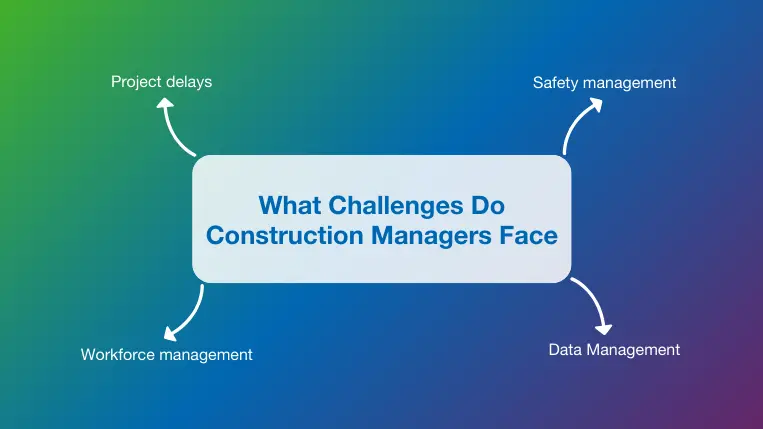
It is crucial to discuss some of the challenges faced by construction managers to get a complete picture of the role. This will put the responsibilities that come with the job into perspective for anyone looking to develop a career as a PM. It is also important to note that most of these challenges can be tackled with the help of the proper construction software solutions—more on that later in the post!
- Project delays: Change is inevitable in construction projects. However, no matter how prepared the CM is, issues or unforeseen situations can be challenging to manage, especially when following a budget and a schedule. Relying on professional construction planner software is a great way to successfully manage and learn from those situations.
- Safety management: Construction hazards are one of the main challenges for project management. Workers’ safety has to be a priority at all times, and ensuring all aspects are covered can be difficult. Investing in training and the right protective equipment can make a significant difference when dealing with safety concerns.
- Data management: As mentioned earlier, one of the key responsibilities of the CM is to report on progress. As straightforward as this sounds, it can be challenging, especially in big projects where so much is happening simultaneously, and critical information can be lost. To prevent this, CMs need to rely on construction business intelligence technology to automatically track data in real-time and in a centralized location that anyone can access.
- Workforce management: Another challenge for the CM is managing multiple subcontractor teams simultaneously. To prevent delays, they must ensure the equipment and materials arrive on-site at an exact date and time. Efficient planning strategies are crucial to tackling this challenge.
What Kind of Software Do Construction Managers Use for Their Work?
No matter how experienced a CM is, they will always need technology to support their activities, mainly to tackle some of the abovementioned challenges. Below, we explore some common software CMs use to support daily operations.
Site management software
As its name suggests, site management software is designed to help organize and monitor site activities. Construction managers use these solutions to support project scheduling and planning, safety and health regulations compliance, budget, and cost tracking, and much more.
Contract management software
As the person in charge of hiring and managing site personnel, CMs use professional construction contract management software to keep track of all contract documentation, change orders, and other details that ensure healthy relationships with workers.
A great example of such a solution is RIB Candy. Our intuitive platform offers powerful features to manage all aspects of a contract.
These include a centralized environment to access and share construction documents, reporting capabilities to track upcoming deadlines and key milestones, cost management to integrate contract costs with the project budget, and an auditing feature to ensure contracts meet legal and regulatory requirements, among many others.
Collaboration & Document management software
CMs must collaborate and communicate with other stakeholders in their daily operations. This means that documentation, including drawings, construction specifications, schedules, budgets, and more, must be constantly shared and updated to keep everyone on the same page. To avoid version control issues that lead to miscommunications and costly mistakes, CMs rely on professional document management and construction collaboration software to keep all documentation online and easily accessible.
RIB CX is an excellent example of the power of state-of-the-art document management tools. The platform offers a single source of truth where all project information and documentation can be accessed and shared in real-time, boosting communication and collaboration.
The software’s “Publication Space” module allows users to upload documents in various file formats and sizes in a secure and accessible way, with crucial information automatically updated to prevent issues due to misinformation.
Data analysis reporting software
Reporting on progress is another relevant task that CMs must complete. In the past, reports were generated using static PowerPoint presentations or Excel spreadsheets. This is not enough for the fast-paced nature in which construction professionals need to make decisions. That is why CMs rely on modern construction business intelligence software.
An excellent example of these solutions is RIB BI+. Our intuitive construction analytics and reporting software offers powerful business intelligence functionalities that help visualize data in real-time and extract powerful insights for success.
With just a few clicks, users can generate interactive reports in the form of visually appealing dashboards that make exploring data faster and easier. Plus, reports can be shared online and accessed from anywhere, meaning the CM can access the latest project data from their phone directly on-site.
Final Thoughts
Construction managers are crucial in completing projects successfully. They are the most senior position you’ll find on a construction site, and, as such, they bring the necessary knowledge and experience to ensure all activities on-site work according to quality and safety standards.
As our industry becomes increasingly complex, construction managers must keep up with the latest trends and innovations and support themselves with professional software to overcome common challenges and gain an advantage over their competitors.
At RIB Software, we have decades of experience developing solutions tailored specifically for professionals in the construction industry. If you are ready to benefit from a complete toolkit of state-of-the-art construction solutions, get a free demo for RIB Software today!
Most Recent
11 mins read
10 mins read
10 mins read
29 mins read
Blog Categories

Ebook



